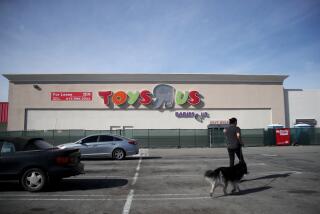Britain Hit by a Rash of Big Takeovers : New, Agressive Style Unsettles London’s Financial District
- Share via
LONDON — During much of the past three years, the American epidemic of huge corporate takeovers has been watched in Britain with a somewhat detached fascination.
But then the takeover fever took hold here.
The London stock market, which had never before seen a billion-pound takeover ($1.4 billion), saw one in November. And, by mid-December, three of the largest merger bids ever seen in the British Isles were on the table, involving the equivalent of $8 billion.
The three, still pending under Britain’s 60-day time limit, are:
- Hanson Trust, a family-run conglomerate, has offered $2.7 billion for the Imperial Group, a tobacco and foods giant. It has not been contested.
- The Argyll Group, a retail food firm, bid $2.8 billion for a company twice its size, the Distillers Co., producers of Johnnie Walker, Black and White and Dewars Scotch whiskies. Distillers has fought the takeover, and on Thursday Argyll raised its offer to $3.2 billion, the largest ever made on the London market.
- General Electric Co., Britain’s largest electronics and heavy electrical firm (it is not connected with the U.S. firm of the same name), has proposed a $2.5-billion merger with Plessey Co., another of the country’s big electronics firms. Plessey has contested, contending that the two companies are “culturally miles apart.”
Since the announcement of these intended takeovers, the air in London’s financial district has been thick with speculation about which corporate giant will make the next move. According to a survey published recently by the stockbrokers Simon & Coates, more than 50 of the country’s largest 300 companies are subject to some form of takeover speculation.
Aside from their sheer size, the rash of takeover bids has been characterized by a new, aggressive style that has unsettled the clubby, fair-play traditions of doing business in the City, as the financial district is known.
The Argyll-Distillers battle has been unusually bitter by British standards, with Argyll running full-page advertisements almost daily in the national press aimed at Distillers’ stockholders. One referred to Distillers as being among the worst-run large companies in Britain and as a “classic British failure.”
By way of reply, William Spengler, deputy chairman of Distillers, said of Argyll Chairman James Gulliver: “Mr. Gulliver deals in potatoes and cans of beans. He doesn’t understand the whisky business.”
Full-Page Ad
The Imperial Group has also used public advertising to fight the Hanson bid. Its full-page ad in Friday’s Financial Times advised shareholders with a larger-than-life thumb--turned down.
All these developments have strained the London market’s reliance on informal self-policing, rather than the law, in dealing with takeovers. They have also raised questions about the merger policy of Prime Minister Margaret Thatcher’s Conservative government, which judges mergers and takeovers primarily on competitive grounds.
Officials at the Department of Trade and Industry who are responsible for setting the policy admit that the rash of bids has generated a review of the policy. Experts in the City think that the policy could be expanded to include consideration of economic conditions and the impact of a proposed merger on employment and will include other social criteria as well.
The most controversial of the larger bids has come from a free-wheeling Australian, John Elliott, who owns Elders IXL, which produces Fosters beer among others. Elliott, a tough, barrel-chested, gravel-voiced man who drinks his beer from the can, has made an aggressive, heavily debt-financed offer of $2.6 billion for Allied-Lyons, a British alcoholic beverage and foods giant that is four times the size of his company.
Unusual in Britain
Although such highly leveraged bids have become common in the United States, they are unusual in Britain. The government quickly ordered the Monopolies and Mergers Commission to investigate the Elders bid to determine whether it is against the public interest. It was the first time an investigation had been ordered in Britain because of the financial terms of a proposed takeover.
“It has raised issues that haven’t been raised here before,” said Christopher Roshier, director of corporate finance for Hill Samuel Ltd., the London investment banker retained by Elders. “It’s the first of a new breed in London.”
The Elders bid has also generated fear that Britain might somehow fall prey to the free-for-all tactics of U.S. corporate raiders, including the use of low-rated corporate bonds, known as junk bonds. The bonds are used by corporate raiders in a practice known as greenmail: The raider buys a stake in a company and then threatens a complete takeover unless the target company buys back his stake at a premium.
Such a development seems highly unlikely here. Corporate bonds have never been popular in London, mainly because of the extremely high interest rates they would require in a market where the prime interest rate last year rose as high as 14%.
Informal Code
But the main barrier is London’s highly flexible, informal code of self-regulation, under which pillars of the City establishment, not the law, decide what is permissible. Bound by hardly any statutes or case law, the British system is in dramatic contrast to the system in the United States, where takeover battles are usually won and lost in the courts on points of law.
The focal point of the British system is the Panel on Takeovers and Mergers, which is made up of representatives of large banks, the London Stock Exchange and major investor institutions. It enforces a set of agreed rules.
“You can be as legalistic as you want here, but if the panel says ‘no’ there’s little you can do about it,” said Thomas Sharpe, a corporate lawyer here who specializes in mergers.
The City’s rules preclude many of the tactics used by successful raiders in the United States. For example, offering cash to acquire a majority of a company’s stock and junk bonds for the balance is not permitted on the London market, where all shareholders must be offered equal terms.
Cash-Offer Requirement
Greenmail is difficult here because of constraints on a company purchasing its own stock and because of a rule that anyone acquiring 15% of a company in a 12-month period must make a cash offer for the entire company.
Although it is not backed by the force of law, the takeover panel, which monitors all bids to make sure they stay within the rules, wields considerable power.
Last fall, for example, brewer Scottish & Newcastle’s bid for a rival, Matthew Brown, was rejected because it failed by a matter of minutes to meet the panel’s requirements within the specified time frame.
Also, the panel required Argyll Chairman Gulliver to wait three months before launching his bid for Distillers because he had made a public statement that he had no plans to bid for the company “at the present time.”
The role of institutional investors, who dominate the London Stock Exchange--they are responsible for roughly three of every four transactions on the exchange--is also an important buffer. If the institutions are not willing to underwrite a paper takeover, it is doomed.
Several Factors
People who work in London’s financial market believe that several factors are responsible for the wave of takeovers.
For one thing, prolonged economic prosperity--accompanied by a strong bull market--has brought unprecedented strength to successful companies.
“Many companies have built up strong cash surpluses in the past few years and feel they are under-geared (have too little debt),” said Ian Stevenson, a director of the stockbrokers Wood MacKenzie & Co. Ltd. “There is a board-room mood that ‘If we can’t make a bold, aggressive move now, then when can we?’ ”
Other factors, including the glamour and power of a larger holding and what some City analysts call “the stampede” effect, have also played a role.
And an abundance of cash, in accumulated corporate profits and from money markets, has made prime targets of undervalued companies.
No Overt Signs
So far, there are no overt signs that Britain’s takeover boom has distorted corporate financial profiles as in the United States, where fear of becoming an acquisition target has caused many companies to accumulate unnecessary debt and sacrifice longer-term research and development investments to obtain quick returns that keep stock values high.
But large mergers and takeovers have a spotty record in Britain. Surveys of their results indicate that in more than half the cases, overall profitability and the stock value of the enlarged company have declined.
People who have monitored takeover activity also believe that it tends to distract managements from their main task--running their companies.
“British management isn’t very good anyway, and if it gets involved in this kind of game it only becomes weaker,” said Morris Peston, an economics professor at London University and adviser to the previous Labor government on merger policy.
But others cite a positive side, arguing that takeover fever keeps managements alert.
“In the current climate even the biggest companies, who felt they were immune to such things, are worried,” said Roshier, the corporate finance director for Hill Samuel Ltd. “That can’t be bad.”
Quick Halt
How much longer the boom will last is not clear, but most City analysts predict that any significant fall in the stock market will bring a quick halt to takeover activities. If the market holds strong, they speculate, there could be another spurt of acquisitions before the next general elections, which must come before the autumn of next year.
At present, however, the mood in the City continues to be confident and this is the sort of mood that is needed for a takeover climate to endure.
Last week, a group of businessmen acting under the corporate name of Demerger Corp. made a $238-million bid to buy Extel, the telecommunications company. As the name Demerger implies, the bidders hope to break up their target company and sell its components.
“Takeovers we’ve seen so far have been about getting bigger,” Wood MacKenzie’s Stevenson said. “Now we’ve got one moving in the other direction. It demonstrates that in this climate, anything can happen.”
More to Read
Inside the business of entertainment
The Wide Shot brings you news, analysis and insights on everything from streaming wars to production — and what it all means for the future.
You may occasionally receive promotional content from the Los Angeles Times.










